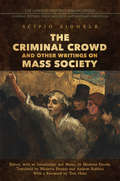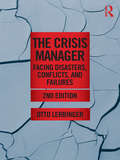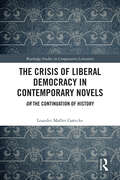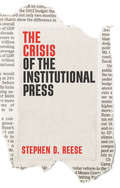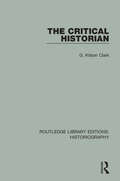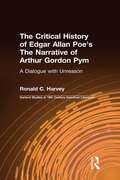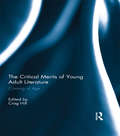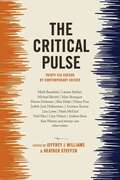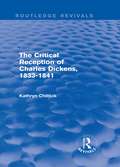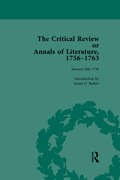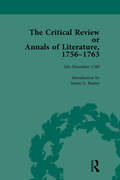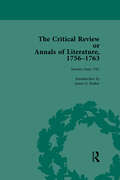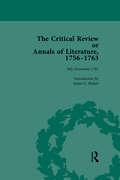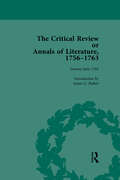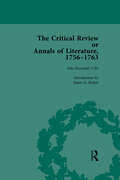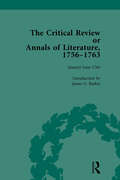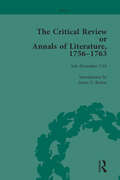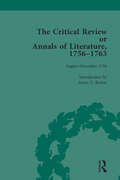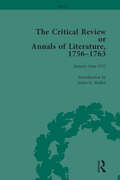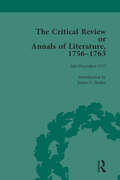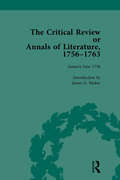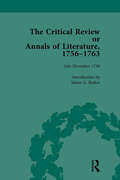- Table View
- List View
The Criminal Crowd and Other Writings on Mass Society (Lorenzo Da Ponte Italian Library)
by Tom Huhn Nicoletta Pireddu Scipio SigheleThe Criminal Crowd and Other Writings on Mass Society is the first English collection of writings by Italian jurist, sociologist, cultural and literary critic Scipio Sighele. Sighele is largely responsible for providing post-unification Italy with a new outlook on issues ranging from the blurring line between individual and collective accountability, the role of urbanization in the development of criminality, and the emancipation of women. This work draws a multifaceted portrait of a provocative thinker and public intellectual caught between tradition and modernity during the European fin de siècle. Containing a comprehensive introduction by the editor, The Criminal Crowd and Other Writings on Mass Society includes Sighele’s seminal work, The Criminal Crowd, as well as his formative studies on group behaviour. Nicoletta Pireddu contextualizes Sighele’s contribution to the so-called ‘age-of crowds,’ from the fierce polemic with his French rivals Gustave LeBon and Gabriel Tarde to the scientific, literary, and cultural developments of his conceptualization of mass behaviours as a legitimate object of psychological investigation into a new century.
The Crisis Manager: Facing Disasters, Conflicts, and Failures (Lea’s Communication Series)
by Otto LerbingerResponding to the era of crises in which we now live, The Crisis Manager offers wise counsel for anticipating and responding to crises as well as taking the steps required to reduce the impact of these events. Spotlighting the reality of crisis at levels ranging from local to global, author Otto Lerbinger helps readers understand the approaches and ways of thinking required for successful crisis management in today's world. As no organization or individual is immune from crisis, he guides managers to make good decisions under conditions of high uncertainty, and to consider the interests not only of stockholders but also of a wide variety of stakeholders. With a focus on the threat of crises to an organization's most valuable asset - its reputation - The Crisis Manager covers: Preparation for crisis, including crisis communication planning Physical crises - natural, biological, and technological "Human climate" crises, stemming from targeted attacks on an organization's policies, actions, or physical holdings Crises due to management failure, including mismanagement, skewed values, deception, and misconduct New to this second edition are the use of social media in crisis management, and chapters on image restoration strategies and crises stemming from mismanagement, as well as a comprehensive updating of the entire work. Real-world case studies provide examples of what worked and what did not work, and the reasons why. Written for present and future crisis managers in all types of businesses and organizations, this resource will be required reading for students in public relations, business, and management, as it prepares them for their crucial roles as decision makers.
The Crisis of Journalism Reconsidered
by Jeffrey C. Alexander Alexander, Jeffrey C. and Breese, Elizabeth Butler and Luengo, María Elizabeth Butler Breese María LuengoThis collection of original essays brings a dramatically different perspective to bear on the contemporary 'crisis of journalism'. Rather than seeing technological and economic change as the primary causes of current anxieties, The Crisis of Journalism Reconsidered draws attention to the role played by the cultural commitments of journalism itself. Linking these professional ethics to the democratic aspirations of the broader societies in which journalists ply their craft, it examines how the new technologies are being shaped to sustain value commitments rather than undermining them. Recent technological change and the economic upheaval it has produced are coded by social meanings. It is this cultural framework that actually transforms these 'objective' changes into a crisis. The book argues that cultural codes not only trigger sharp anxiety about technological and economic changes, but provide pathways to control them, so that the democratic practices of independent journalism can be sustained in new forms.
The Crisis of Liberal Democracy in Contemporary Novels: or The Continuation of History (Routledge Studies in Comparative Literature)
by Leander Møller GøttckeThis book explores how contemporary novels reflect a profound shift in Western culture, from the political optimism of the post-Cold War era to growing fears about the future of liberal democracy. Analysing four major works – Karl Ove Knausgård's My Struggle series, Zadie Smith's White Teeth, Boualem Sansal's 2084 and Michel Houellebecq's Submission – it shows how these novels illuminate current social discontents and engages the anxieties of our time. Where the so-called "end-of-history" narrative once promised a triumphant liberal democracy, novelistic fiction today reflects a more ominous outlook: progressives are haunted by dystopian visions of democratic decline, while reactionaries fear cultural displacement and yearn for a lost Golden Age. Bridging literary analysis and political theory, the book offers new perspectives on how literature engages with and challenges contemporary political narratives, making it a vital resource for those interested in the intersection of politics and literature.
The Crisis of the Institutional Press
by Stephen D. ReeseAs polarized factions in society pull apart from economic dislocation, tribalism, and fear, and as strident attacks on the press make its survival more precarious, the need for an institutionally organized forum in civic life has become increasingly important. Populist challenges amplified by a counter-institutional media system have contributed to the long-term decline in journalistic authority, exploiting a post-truth mentality that strikes at its very core. In this timely book, Stephen Reese considers these threats through a new conception of the ‘hybrid institution’: an idea that extends beyond the traditional newsroom, and distributes across multiple platforms, national boundaries, and social actors. What is it about the institutional press that we value, and around what normative standards could a hybrid institution emerge? Addressing these questions, Reese highlights how this is no time to be passive but rather to articulate and defend greater aspirations. The institutional press matters more than ever: a reality that must be communicated to a public that depends on it. The Crisis of the Institutional Press is an essential resource for students and scholars of journalism, media and communication.
The Critical Historian (Routledge Library Editions: Historiography)
by G Kitson ClarkOriginally published in 1967, this book analyses the method by which historical evidence is built up and compares the nature of historical proof with that of other disciplines such as the law and natural sciences. It examines an extraordinary series of forgeries and distortions from the False Decretals to the biographies of Lytton Strachey, as well as discussing how an historical reputation such as that enjoyed by Judge Jefferies was created.
The Critical History of Edgar Allan Poe's The Narrative of Arthur Gordon Pym: A Dialogue with Unreason (Garland Studies in 19th Century American Literature #Vol. 8)
by Ronald C. HarveyFirst published in 1999. Routledge is an imprint of Taylor & Francis, an informa company.
The Critical Merits of Young Adult Literature: Coming of Age
by Crag HillThis examination of the literary effectiveness of young adult literature from a critical, research-oriented perspective answers two key questions asked by many teachers and scholars in the field: Does young adult literature stand up on its own as literature? Is it worthy of close study? The treatment is both conceptual and pragmatic. Each chapter discusses a topical text set of YA novels in a conceptual framework—how these novels contribute to or deconstruct conventional wisdom about key topics from identity formation to awareness of world issues, while also providing a springboard in secondary and college classrooms for critical discussion of these novels. Uncloaking many of the issues that have been essentially invisible in discussions of YA literature, these essays can then guide the design of curriculum through which adolescent readers hone the necessary skills to unpack the ideologies embedded in YA narratives. The annotated bibliography provides supplementary articles and books germane to all the issues discussed. Closing "End Points" highlight and reinforce cross-cutting themes throughout the book and tie the essays together.
The Critical Path and Other Writings on Critical Theory, 1963-1975
by Alvin A. Lee Eva Kushner Jean O'GradyThis volume, which collects Northrop Frye's writings on the theory of literary criticism from the middle period of his career, includes one of Frye's own favourites, The Critical Path (1971). A highly important marker of Frye's career, The Critical Path openly addresses topics that he had previously been reluctant to discuss as fully, including the importance of literature to society, the responsibilities of critics, and the deeper rationales for studying literature.Filled with insightful texts that indicate his transition from literary critic to a theorist of language, myth, and human culture, this edition helps to illuminate many of the ideas and arguments that would appear later in The Great Code and Words with Power. Accompanied by the rigorous scholarship for which the series is renowned, this is another valuable contribution to literary criticism and theory.
The Critical Pulse: Thirty-Six Credos by Contemporary Critics
by Jeffrey J. Williams Heather SteffenThis unprecedented anthology asks thirty-six leading literary and cultural critics to elaborate on the nature of their profession. With the humanities feeling the pinch of financial and political pressures, and its disciplines resting on increasingly uncertain conceptual ground, there couldn't be a better time for critics to reassert their widespread relevance and purpose. These credos boldly defend the function of criticism in contemporary society and showcase its vitality in the era after theory. Essays address literature and politics, with some focusing on the sorry state of higher education and others concentrating on teaching and the fate of the humanities. All reflect the critics' personal, particular experiences. Deeply personal and engaging, these stories move, amuse, and inspire, ultimately encouraging the reader to develop his or her own critical credo with which to approach the world. Reflecting on the past, looking forward to the future, and committed to the power of productive critical thought, this volume proves the value of criticism for today's skeptical audiences.
The Critical Pulse: Thirty-Six Credos by Contemporary Critics
by Jeffrey J. Williams Heather SteffenThis unprecedented anthology asks thirty-six leading literary and cultural critics to elaborate on the nature of their profession. With the humanities feeling the pinch of financial and political pressures, and its disciplines resting on increasingly uncertain conceptual ground, there couldn't be a better time for critics to reassert their widespread relevance and purpose. These credos boldly defend the function of criticism in contemporary society and showcase its vitality in the era after theory.Essays address literature and politics, with some focusing on the sorry state of higher education and others concentrating on teaching and the fate of the humanities. All reflect the critics' personal, particular experiences. Deeply personal and engaging, these stories move, amuse, and inspire, ultimately encouraging the reader to develop his or her own critical credo with which to approach the world. Reflecting on the past, looking forward to the future, and committed to the power of productive critical thought, this volume proves the value of criticism for today's skeptical audiences.Contributors: Andrew Ross, Amitava Kumar, Lisa Lowe, Vincent B. Leitch, Craig Womack, Jeffrey J. Williams, Marc Bousquet, Katie Hogan, Michelle A. Massé, John Conley, Heather Steffen, Paul Lauter, Cary Nelson, David B. Downing, Barbara Foley, Michael Bérubé, Victor Cohen, Gerald Graff, William Germano, Ann Pellegrini, Bruce Robbins, Kenneth Warren, Diana Fuss, Lauren Berlant, Toril Moi, Morris Dickstein, Rita Felski, David R. Shumway, Mark Bauerlein, Devoney Looser, Stephen Burt, Mark Greif, Kathleen Fitzpatrick, Mark McGurl, Frances Negrón-Muntaner, Judith Jack Halberstam
The Critical Reception of Charles Dickens, 1833-1841 (Routledge Revivals)
by Kathryn ChittickThis bibliography, first published in 1989, brings together a number of reviews of the early Dickens which appeared in contemporary magazines, newspapers, and quarterlies during the eight years between 1833 and 1841. The chronological arrangement of reviews, both of Dickens and others, forms the core of this study. This book is perfect for those studying Dickens and his works in-depth.
The Critical Review or Annals of Literature, 1756-1763 Vol 1
by James G BaskerThe "Critical Review" reflects the political, scientific and literary debate of the times. The journal was edited for its first seven years by Tobias Smollett and reflected the slashing, combative style and intellectual range of its editor. This 16-volume set reproduces this journal.
The Critical Review or Annals of Literature, 1756-1763 Vol 10
by James G BaskerThe "Critical Review" reflects the political, scientific and literary debate of the times. The journal was edited for its first seven years by Tobias Smollett and reflected the slashing, combative style and intellectual range of its editor. This 16-volume set reproduces this journal.
The Critical Review or Annals of Literature, 1756-1763 Vol 11
by James G BaskerThe "Critical Review" reflects the political, scientific and literary debate of the times. The journal was edited for its first seven years by Tobias Smollett and reflected the slashing, combative style and intellectual range of its editor. This 16-volume set reproduces this journal.
The Critical Review or Annals of Literature, 1756-1763 Vol 12
by James G BaskerThe "Critical Review" reflects the political, scientific and literary debate of the times. The journal was edited for its first seven years by Tobias Smollett and reflected the slashing, combative style and intellectual range of its editor. This 16-volume set reproduces this journal.
The Critical Review or Annals of Literature, 1756-1763 Vol 13
by James G BaskerThe "Critical Review" reflects the political, scientific and literary debate of the times. The journal was edited for its first seven years by Tobias Smollett and reflected the slashing, combative style and intellectual range of its editor. This 16-volume set reproduces this journal.
The Critical Review or Annals of Literature, 1756-1763 Vol 14
by James G BaskerThe "Critical Review" reflects the political, scientific and literary debate of the times. The journal was edited for its first seven years by Tobias Smollett and reflected the slashing, combative style and intellectual range of its editor. This 16-volume set reproduces this journal.
The Critical Review or Annals of Literature, 1756-1763 Vol 15
by James G BaskerThe "Critical Review" reflects the political, scientific and literary debate of the times. The journal was edited for its first seven years by Tobias Smollett and reflected the slashing, combative style and intellectual range of its editor. This 16-volume set reproduces this journal.
The Critical Review or Annals of Literature, 1756-1763 Vol 16
by James G BaskerThe "Critical Review" reflects the political, scientific and literary debate of the times. The journal was edited for its first seven years by Tobias Smollett and reflected the slashing, combative style and intellectual range of its editor. This 16-volume set reproduces this journal.
The Critical Review or Annals of Literature, 1756-1763 Vol 2
by James G BaskerThe "Critical Review" reflects the political, scientific and literary debate of the times. The journal was edited for its first seven years by Tobias Smollett and reflected the slashing, combative style and intellectual range of its editor. This 16-volume set reproduces this journal.
The Critical Review or Annals of Literature, 1756-1763 Vol 3
by James G BaskerThe "Critical Review" reflects the political, scientific and literary debate of the times. The journal was edited for its first seven years by Tobias Smollett and reflected the slashing, combative style and intellectual range of its editor. This 16-volume set reproduces this journal.
The Critical Review or Annals of Literature, 1756-1763 Vol 4
by James G BaskerThe "Critical Review" reflects the political, scientific and literary debate of the times. The journal was edited for its first seven years by Tobias Smollett and reflected the slashing, combative style and intellectual range of its editor. This 16-volume set reproduces this journal.
The Critical Review or Annals of Literature, 1756-1763 Vol 5
by James G BaskerThe "Critical Review" reflects the political, scientific and literary debate of the times. The journal was edited for its first seven years by Tobias Smollett and reflected the slashing, combative style and intellectual range of its editor. This 16-volume set reproduces this journal.
The Critical Review or Annals of Literature, 1756-1763 Vol 6
by James G BaskerThe "Critical Review" reflects the political, scientific and literary debate of the times. The journal was edited for its first seven years by Tobias Smollett and reflected the slashing, combative style and intellectual range of its editor. This 16-volume set reproduces this journal.
